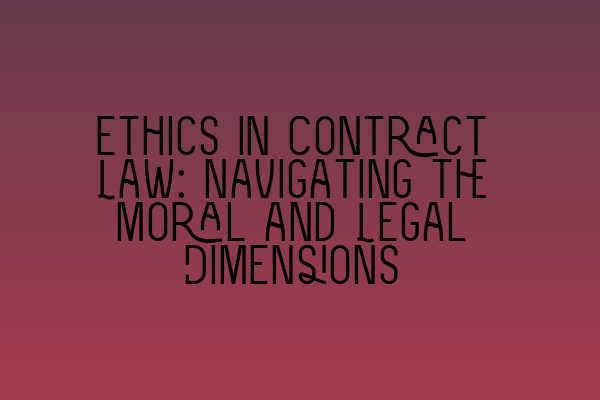Ethics in Contract Law: Navigating the Moral and Legal Dimensions
Contract law is a fundamental aspect of the legal system that governs our society. It provides a framework for individuals and businesses to enter into agreements and ensures that both parties uphold their obligations. However, beyond the legal technicalities, there is an underlying ethical dimension that must be considered when navigating the intricacies of contract law.
In this blog post, we will explore the ethical implications and considerations that lawyers, solicitors, and legal professionals face when dealing with contract law. We will delve into the moral dilemmas that can arise, the importance of ethical practices, and how they intersect with the legal aspects of contract law.
The Role of Ethics in Contract Law
Ethics, defined as the moral principles that guide behavior, play a crucial role in contract law. While legal codes and statutes provide a framework for enforcing contracts, it is the ethical obligations of legal professionals that ensure fairness, honesty, and integrity prevail.
At SQE Contract Law, we believe that lawyers should not only comply with the law but also go beyond mere compliance to act in the best interest of their clients and society as a whole. This includes being transparent, honest, and ensuring that contracts are fair and equitable for all parties involved.
Moral Dilemmas and Ethical Considerations
In the world of contract law, lawyers often encounter moral dilemmas and ethical considerations that require careful thought and decision-making. One such dilemma is the conflict between zealous advocacy for a client and the duty to promote justice and fairness.
Lawyers must strike a delicate balance between representing their clients’ interests vigorously and adhering to ethical standards. This means avoiding misrepresentation, providing full disclosure, and ensuring that any agreements reached are based on informed consent and mutual understanding.
Another ethical consideration in contract law is the use of legal loopholes or ambiguous language to gain an unfair advantage. While it may be technically within the bounds of the law, using such tactics raises questions of morality and can erode public trust in the legal profession.
At SQE Contract Law, we emphasize the importance of avoiding exploitative practices and finding ethical solutions to legal problems. Our team of solicitors is dedicated to upholding the highest ethical standards and providing honest and fair representation to our clients.
Gaining the Trust of Clients
Trust is the foundation of any successful lawyer-client relationship. In the realm of contract law, trust is especially crucial, as clients rely on their legal counsel to protect their interests and ensure that their agreements are legally binding.
By practicing ethical contract law, solicitors can build strong relationships based on trust and reliability. This involves clear communication, thorough explanations of legal terms and options, and acting in the best interest of the client.
At SQE Contract Law, we understand the significance of trust in the legal profession. Our team strives to foster open and transparent communication with our clients, ensuring that they have a clear understanding of their legal rights and obligations.
Conclusion
In conclusion, ethics in contract law are essential in maintaining the integrity of the legal profession. Legal professionals have a dual role of upholding the law while also acting in the best interest of their clients. By navigating the moral and legal dimensions of contract law, solicitors can ensure fairness, justice, and trust in the agreements they facilitate.
At SQE Contract Law, we are committed to practicing contract law with the utmost ethical standards. If you require legal assistance or have any questions regarding contract law, please feel free to contact us for a confidential consultation.
Related Articles:
